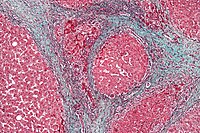
Photo from wikipedia
Aim The present study was aimed at comparing serum markers and APACHE-II score to predict persistent organ failure (POF) in early acute pancreatitis (AP). Methods In this retrospective study, data… Click to show full abstract
Aim The present study was aimed at comparing serum markers and APACHE-II score to predict persistent organ failure (POF) in early acute pancreatitis (AP). Methods In this retrospective study, data from 6024 patients with AP were included within 24 h of their admission. Serum levels of urea nitrogen (BUN), creatinine, glucose, and hematocrit and APACHE-II score were analyzed for patients with AP. We employed the area under the receiver operating characteristic (ROC) curve (AUC), sensitivity, and specificity analyses to evaluate the accuracy of the studied laboratory parameters and APACHE-II score. Results Our study included 2090 (35%) patients out of 6024 patients who were evaluated within 24 h of hospital admission. For predicting POF, serum creatinine level ≥ 1.8 mg/dl had the highest specificity (98%). The second classification tree has shown that when the serum creatinine level > 1.8 and APACHE − II ≥ 8 within 24 h were combined, the rates of predicted persistent organ failure achieved 66.7%. Conclusions In this large, hospital-based retrospective study, we demonstrated that an APACHE-II score ≥ 8 and a serum creatinine level ≥ 1.8 mg/dl within 24 h of admission can positively predict POF in AP and that serum creatinine levels < 1.8 mg/dl within 24 h of admission can be useful for negatively predicting POF in AP.
Journal Title: Gastroenterology Research and Practice
Year Published: 2019
Link to full text (if available)
Share on Social Media: Sign Up to like & get
recommendations!